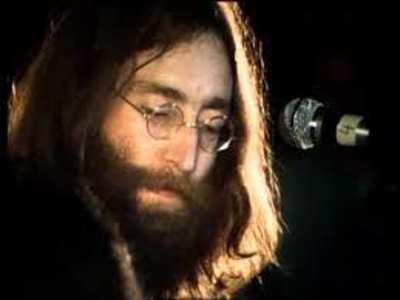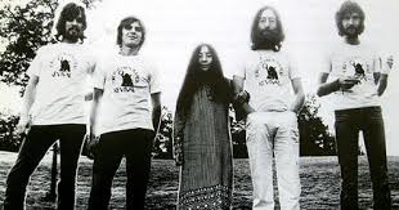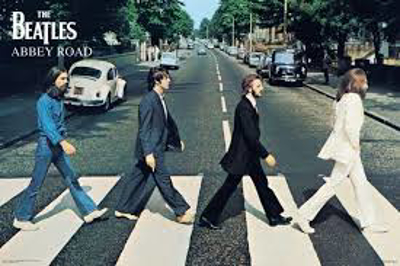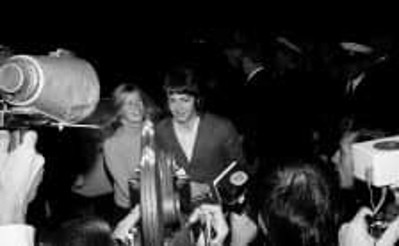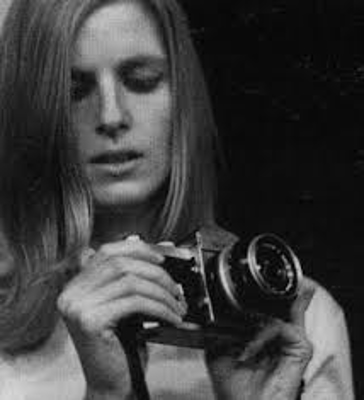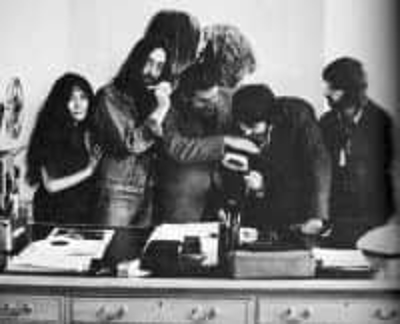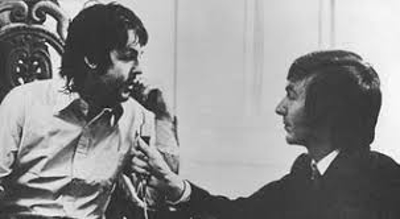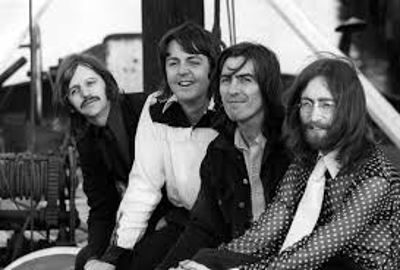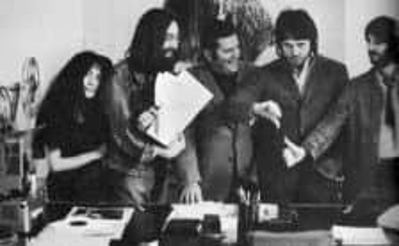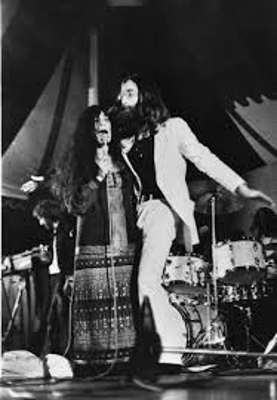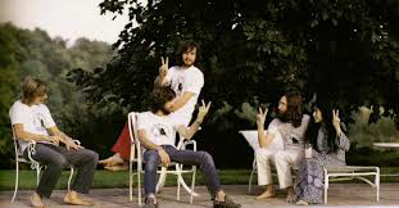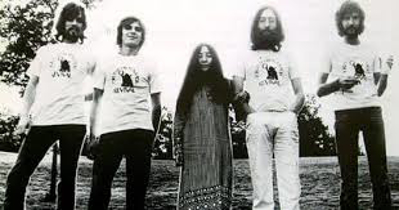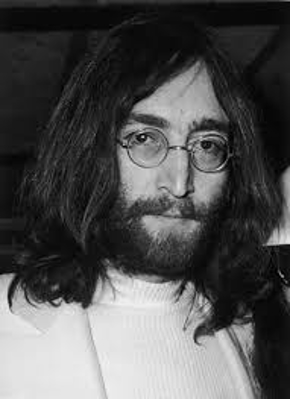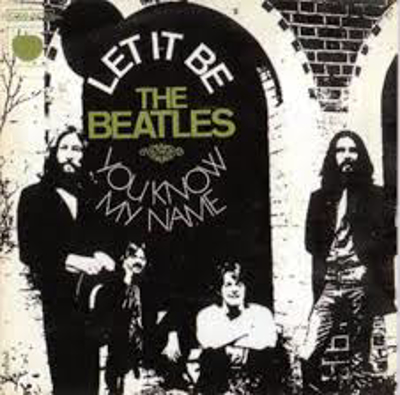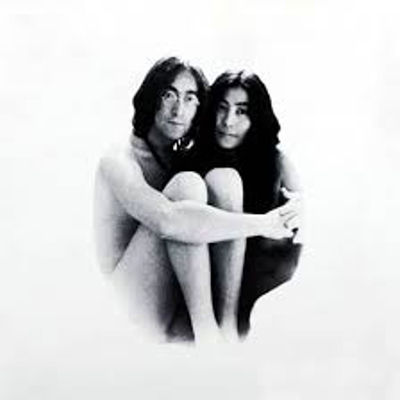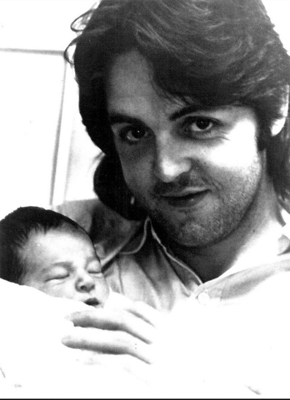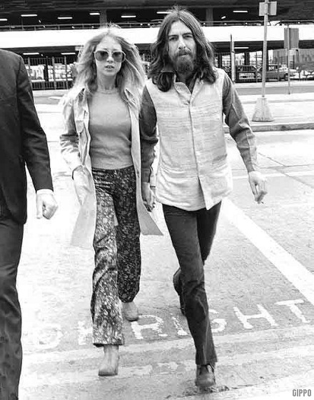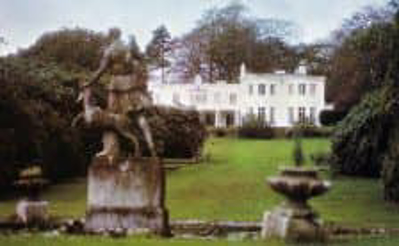On September 19th 1969, Paul McCartney was interviewed at Apple offices in London by David Wigg. Their discussion would air a few days later on the BBC Radio-One program ‘Scene and Heard.'
Wigg would later remember of his chat with McCartney: "The interview was held in the Apple offices in London. Paul sat in a handsomely carved chair that belonged to George Harrison. Paul talks of enjoying life as a family man. Paul also explains about the musical, business and personal differences within the band. He was very unhappy with the whole situation, largely because he never favored Allen Klein to handle their financial affairs. We discussed Paul's plans, the Abbey Road album, the day they received their MBE's, the Royal family, and what had caused the Beatles to change."
In addition to being a BBC radio personality, David Wigg was also famous for being a columnist for the Daily Express, as well as the London Evening News. In 1976, Wigg would release a double album featuring his interviews with each of the four Beatles, entitled 'The Beatles Tapes.'
The Abbey Road album would be released in the UK on September 26th, one week after this interview was recorded.
DAVID WIGG: "Paul, first of all congratulations on another super LP from the Beatles. What were your own favorite numbers? Which were you particularly satisfied yourself on this LP? Which ones stand out?"
PAUL: "Well, I like Come Together. That's a great one, which is John's one, yeah."
DAVID: "Yeah."
PAUL: "I like Something... George writes. I think for me, I think it's the best he's written. And I like Because on the second side."
DAVID: "Why did you use the lyric, 'Turn me on' and 'blow my mind' in that particular song? I rather felt that sounded a bit passe in 1969, 'cuz it's been used so much in the past."
PAUL: "Yes, well, they, they were John's lyrics."
(laughter)
PAUL: (jokingly) "Yes, so I'm not taking any blame. But no. If they had been used just straight, it would have been, 'YOU turn me on, YOU blow my mind' Ok, that would have been passe. But to say that 'because the world is round it turns me on' is great, you know. It's like, well, it's not fantastic, but it's as, it's as good as... good enough for me, you know. And 'because the wind is high it blows my mind.' You know, it's much better than, 'You blow my mind, baby, honeybunch.' I like all the others, you know, I think there's not a bad track on it, but my favorites are those ones. And then the long one."
DAVID: "Oh, yes."
PAUL: "The whole of the long one."
DAVID: "Yeah."
PAUL: "The whole of the end bit. I think that works good."
DAVID: "I think there's a lot of people might be surprised that you sort of dared to take Golden Slumbers the well known lullabye and give it a new variation. I enjoyed it very much. But what made you decide to do that, 'cuz the Beatles have never done that before, have they, taken another tune or lyrics?"
PAUL: "No. Well, I'll tell you. I was just playing the piano in Liverpool at my Dad's house. And my sister Ruth's pianobook, she was learning the piano, and you know there's a sort of... 'Golden Slumbers and Your Old Favorites' was up on the thing, you know. It was a stand, you know, as a little book with all those words in it and stuff. So I was just flicking through it and I came to Golden Slumbers, you know. So I just started... 'cuz I can't read music so I didn't know the tune, and I can't remember the old tune, you know."
DAVID: (giggles)
PAUL: "So I started just playing MY tune to it. And then I liked the words so I just kept that, you know. And then it fitted with another bit of song I had which is the verse in between it. So I just made that into a song. It just happened 'cuz I was reading her book."
DAVID: "And what about the reference to the Queen? What made you put that on the LP? That's caused a lot of surprise. (referring to advance promotional copies of the unreleased album) It's very nice but it was, you know, a lot of people didn't know it was there."
PAUL: "I saw your column in the Daily newspaper."
DAVID: (laughing) "I wish I could have got hold of you."
PAUL: "That was just, I don't know, you know, I was in Scotland and I was just writing this little tune, you know. I can never tell, like, how tunes come out. I just wrote it as a joke, you know."
DAVID: "Has the Queen or any member of the Royal Family ever discussed your music with you? Do they ever..."
PAUL: "No, the only time I ever talked to a member of the Royal Family really was with the Queen Mother, when she... on a Variety Performance then. And she just said, 'Where are you playing tomorrow night?' It wasn't exactly about music. And I think I said, or one of us said, 'Slough.' And she said, 'Oh, that's just near us?'"
DAVID: (laughter) "I understand Princess Anne goes out and buys your records."
PAUL: "Apparently. I know we did autographs once a couple of years ago. I think they were for Prince Charles and Princess Anne, so..."
DAVID: "What do you think of the monarchy today?"
PAUL: "I don't really think about it. I like that film, you know. I enjoyed that film and... I don't know. It doesn't interest me one way or the other, you know. I think they're nice people. They seem alright, you know, the Queen tells a good joke and she did in that film, you know. They're good."
DAVID: "When you had your MBE's, how did it strike you then? Do you think they've changed very much since those days?"
PAUL: "They, the Family?"
DAVID: "Yes. Do you think the image is..."
PAUL: "I do, yes, obviously, you know. It's got a bit more 'of the people,' you know. They've got a bit more sort of down to earth. When we got the MBE's, first, I sort of really believed, you know, having been brought up in it, the whole thing of, you know... 'Her Majesty' and all that stuff, you know, which is great. I thought, it's a great honor getting an MBE, obviously."
DAVID: "Yes, of course."
PAUL: "We went to the Palace and lined up with the other 5 million people who were getting it and then after you've been presented, you know, you sort of go the other end of the corridor and they give you this little medal. You do sort of think, well, it's not like you imagined it, you know, like I suppose in your dreams you'd have this great sort of... the Queen sits there with her great flowing robes and puts a sword on your shoulder and stuff. Well, you know, in fact they just give you a medal. And the medal sort of says, thanks from us. But apparently Howard Wilson really gives you it. Apparently he decides who gets them, so I don't know."
DAVID: "But you wouldn't do a Royal Variety Show, would you?"
PAUL: "Well, the reason we didn't want to do a Royal Variety Shows after a bit is that we did one and it went down great. And the only reason we didn't really want to do it the next year is that, you go and do it again and, say, it doesn't go down QUITE as well... Then it's just you're tryin' to repeat yourself, you know. And someone says, 'Well, last year they were sensational with rattle your jewels and oh, what a great show,' you know. This year, hmm, no laughs this year, say or... That was the only reason. There was no sort of thing about we won't do a Royal Variety. It's just, you know, could have been any other show. We wouldn't try and repeat our success say at Shea Stadium, you know. Once you've reached the peak of a thing there's no point in doing it twice."
DAVID: "Yes."
PAUL: "Unless you really intend to sort of go on and make that your thing to keep going on Royal Varieties. But we felt we'd done it once and that was enough."
DAVID: "What are the trappings of being Paul McCartney, Beatle Paul?"
PAUL: "Lack of privacy, that's THE trapping."
DAVID: "That's the main thing."
PAUL: "Yes, it bothers me, yeah sure it does."
DAVID: "Yes."
PAUL: "Well, the thing is, I like it when we're working. Or when I come to Apple, I expect to do autographs and just to perform in fact, you know. 'Cuz you have to switch-on a bit. But I also love to switch-off, like anyone. You come home after a hard day's work, you wanna switch-off. But sometimes, there's still people outside the house and I sort of say, 'Well, you know, can you leave us alone now, 'cuz like, we just had a baby. Give us bit of a chance,' you know. Sometimes."
DAVID: "How is the baby?"
PAUL: (proudly) "She's fantastic, yes, she's beautiful. She's about the best looking baby I've ever seen. Nicest. Just started on cereal, took every drop!"
DAVID: (laughs)
PAUL: "For all the mothers and fathers listening."
DAVID: "And now, are we going have a 'Mary' song?"
PAUL: "I don't know."
DAVID: "Soon?"
PAUL: "I don't know. There's, we did a song which has Mary in it, but it was written before she was born."
DAVID: "I see."
PAUL: "So I mean, I suppose she's already immortalized in a song."
DAVID: (laughs) "Do you plan to have more? Do you want a large family?"
PAUL: "Oh yeah. As many as..."
DAVID: "Would you like to have a son?"
PAUL: "I don't know. Yeah. I like to have anything, you know."
DAVID: (laughs)
PAUL: "I love KIDS, you know. They're great. We've got two now, which is like instant family."
DAVID: "Yes."
PAUL: (laughs) "And it's great, you know. It's lovely, 'cuz I love them both."
DAVID: "Do you feel a different person through marriage, I mean, do you feel sort of, matured?"
PAUL: "Yeah, I've never had a kid before, so that, you can't help to feel different. It takes a bit of time to click. It still hasn't really clicked that we've got a new daughter, you know."
DAVID: "Yes."
PAUL: "It takes a bit of time. I feel different, yeah. I don't feel any sort of steadier than I have ever felt, you know. I don't, I'm waiting for me settle down."
(laughter)
DAVID: "Do you find it terribly difficult to choose your friends because I would think in your position it must be awfully difficult. The people that probably would be nicer, you know, wouldn't sort of come and say hello to you, and get to know you."
PAUL: "Yeah."
DAVID: "One feels that you might be getting surrounded by a lot of the wrong people."
PAUL: "Yeah, I think that happens."
DAVID: "'Cuz they've got the cheek to, you know, get to know you."
PAUL: "That happens, but generally the ones who are friends choose themselves, you know. It just seems to happen. And you don't sort of go out and say, 'I'll have you for my friend.' You do get a few hangers on, of course. But they fall away."
DAVID: "You've got your eyes open for that sort of thing?"
PAUL: "Yeah. I mean, they can't stick if they're only hangers on. You know, it's funny. It's like water on a duck's back, you know. They try and get on but they roll off."
DAVID: "Did you ever have any complexes about this. You know, people wanting to know you?"
PAUL: "Not really, you know."
DAVID: "Just for what you represent."
PAUL: "I mean, that wouldn't worry me, you know. I accept that some people want an autograph. Some people want money. Some people want you to do them a favor and stuff. But, you know, there's always that. We get it magnified 'cuz we're us. We the Beatles, not the Royal 'we.'"
DAVID: (laughs)
PAUL: "It gets magnified, but everyone gets that, you know. There's always some of them who's got an uncle or something who wants a few bob. But he suddenly becomes the uncle you're not talking to or the one you're not really friends with."
DAVID: "What about the image of the Beatles. Now there's no doubt that the older generation who've been very for you, a lot of them have started saying things like, 'Oh they're not like they used to be, what are they doing,' you know. 'All this hair...'"
PAUL: "It's true."
DAVID: "Does this disturb you, that you might lose some of your old...?"
PAUL: "No, no. See, the thing is... you grow up, you know. Everyone grows up. And it is always a great pity to see a baby turn into an adult. 'Cuz it's always nicer when they're a baby and they go 'goo-goo' and they do everything you want. You know, it's lovely. And in a certain period in our career we were sort of particularly nice, you know. When we had like, a very all-around appeal. It wasn't put on, you know. We just... we were more like that, you know. But as we've grown up, we've... You become more individual. And so like, for instance if you don't want a press interview, like these days we don't have to say, yes. We're more true to ourselves, these days. And it, obviously it doesn't please some people but I think you'll find like a lot of other people like us FOR it. You know, I tell you what happened. We, once in the old days, we used to wear leather jackets, used to wear leather suits a lot. And we changed. Brian said, 'Look lads, smarten up a bit,' you know. 'Get yourselves suits.' So we got suits and ties and stuff and we went on like that. We gained a whole new audience and lost all the people who wanted us in leather."
DAVID: "I see."
PAUL: "See, so this is happening again, you know. I think it always will happen, that. We'll lose all the people who wanted us to be just four nice cleancut lads and who didn't want us to grow beards."
DAVID: "Yes."
PAUL: "And we'll gain all the people who don't care whether we got beards or what, you know. 'Cuz they're out for us."
DAVID: "Yes."
PAUL: "Not for what we look like or what... how nicely we speak, you know. They're out for us being truthful to ourselves, that's what they're interested in."
DAVID: "How much interest and how much control do you have over Apple, now that you have a new manager in Mr. Klein?"
PAUL: "The four of us have it."
DAVID: "Are you like businessmen?"
PAUL: "No, I don't like doing the business bit that much. But you can't avoid it. See, the thing is like, we were once a band, just a band. But then, because we were successful, you can't help it being successful. Money comes in. You can't help that, again. When money comes in, income tax is to be paid. So you can't really help just turning into a businessman 'cuz someone says to you, 'Where's your income tax, mate?' You say, "well, I better go on to someone,' you know. 'I hope I've got a bit to pay you' and stuff. So you got to get all that together, you know. So, it's just force of circumstance. You can't help it."
DAVID: "Paul, what about the future of Beatles? I happen to know that the organizers of the 'Isle Of Wight' pop festival are going to ask you and the rest of Beatles if you will top the bill next year at the Isle Of Wight. Now, what's your reaction to a thing like that? Are you likely to go back on stage and perhaps do a show like that?"
PAUL: "I don't know, you know."
DAVID: "Does it appeal?"
PAUL: "I've never known. I didn't know when we were playing the Cavern that we'd be on the Royal Variety Performance. And after that all the papers said, 'Well, what's left for them.' So then we went to America. They said, 'What's left for 'em' then, you know. And we got into making better albums and stuff. I mean, I just don't know what's gonna happen. It'll be alright though."




